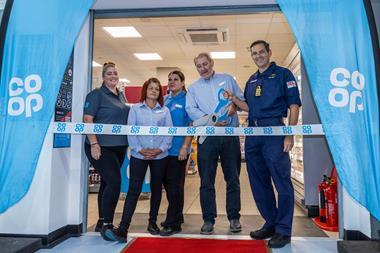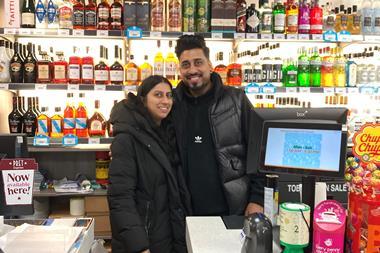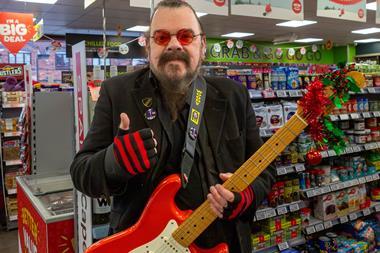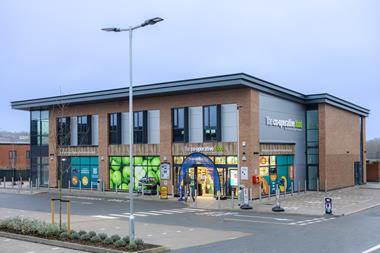We live in a digital age and with most of the UK now covered by broadband, the time may be right to look at the advantages of getting connected.
"Broadband is an essential tool for ensuring access to the latest information at the fastest speed," says Nisa-Today's head of IT David Morris. "All online ordering and access to services such as credit card transaction processing, radio and in-store pos can be done securely via broadband, without the need for separate devices to provide these services."
Morris says broadband can also help reduce queuing times. "Broadband is 'always on' and allows for transactions to be sent immediately at a much higher speed than traditional modems or ISDN connections. Card authorisations should improve and queues should reduce accordingly. Faster transaction speed improves customer satisfaction and enhances the reputation of a store."
Arjan Mehr, who runs a Londis store in Bracknell, Berkshire, has been using broadband as part of a trial by Musgrave. He has seen a huge difference between broadband and the dial-up system he was previously using, especially when it comes to card payments.
"We've had broadband in for six months now and the difference between that and dial-up connection is amazing," says Arjan. "Previously, it could take up to two minutes to authorise a credit card payment, but now it can be done in less than 10 seconds. It makes card payments as fast as supermarkets'."
The broadband scheme that Arjan is part of was trialled in 13 stores and will now be rolled out to all 2,000 Londis and Budgens stores. Musgrave interim IT director Mark Trevorrow says that the move to broadband has improved the security of the group's network. "This is an important step for the company," he says. "The security will help us to better control the information that is sent across the network."
Spar UK head of IT Roy Ford suggests another advantage: having broadband can speed up back office work as well. "A retailer can receive price changes quicker and be aware of promotions immediately," he claims.
Spar began phasing in a broadband network two years ago and has just completed the entire rollout. Ford says that switching to broadband has made communication with members much easier. "We can inform our members about promotions and news quickly, access their epos set-ups remotely if they're having a problem, and update systems in a matter of minutes rather than dialling into each store individually. Now a software update for our members takes about 15 minutes whereas before it took hundreds of man-hours."
The advantages of broadband aren't confined to symbol group members, however. Independent retailers can also reap the benefits, according to Richard Marshall of retail broadband consultants BCP.
"Although not affiliated with a group, an independent retailer will get their stock from the same wholesaler and can connect to a wholesaler's network. This means they will be able to order online quickly, as well as stay informed of any special offers," he says. "Independent retailers also have the advantage of being able to connect to other wholesalers, too, so they can get the best deals."
Marshall adds that it's more likely to be smaller, independent stores that are reticent to invest in broadband, but he believes they have a lot to gain from it. "Some retailers who may be currently just making a living may struggle to justify the cost of installing broadband, but in the long run it will be of huge benefit.
"Broadband provides quicker access to pricing information for all types of retailers and can improve a store's efficiency."
The main requirement that a store needs to meet to be able to connect to broadband is a telephone landline. Another essential is a broadband signal so that stores can connect to the network. This can vary depending on location, but Marshall insists that coverage is adequate throughout the UK. "Generally, a c-store will have good coverage as they are not too remote, usually based in, or close to, towns and villages," he says. "The level of coverage in most places is more than enough to carry broadband."
Once a landline is in place and you are happy with your level of coverage, then you have to choose a provider. Symbol group head offices will usually recommend one for members, but Marshall insists that it's important to examine what each potential provider has to offer. "All business broadband providers have to be PCI compliant, which means they have security measures in place for credit card transactions, so what retailers need to be looking at is what after-sales support they provide and extras they can offer."
Ford says that it's useful to look at what a provider has done for other businesses. "It's essential that you go with an established supplier with a proven track record," he says. "Cost is only one element when it comes to choosing a supplier you have to ensure they're dependable and have a good after-sales service. I would look at who other similar businesses have used and see how that worked out."
While cost is only one element in choosing a broadband package, it's still an important aspect for retailers. Depending on the company and the level of service provided, prices can be as little as £20 a month for a business broadband service.
"Standard business level broadband packages are likely to be from £20 a month, with additional services increasing this cost," says Morris. "NTNet from Nisa-Today's can be delivered as a business broadband service, with extended support, direct access to the ordering portal plus virus scanning and filtered content from £23.45 a month."
Marshall says despite retailers having to pay the monthly fee, installing broadband may well work out cheaper for them than their current internet connection in the long run. "If a store has several epos systems connected to the internet then a separate phone line is needed for each system, which means that stores are paying line rental for each till that they are using. By changing to broadband, they can do away with paying for several phone lines and have all of their epos systems connected through the one line."
Arjan, whose provider is Vodat International, says that the cost of his connection is great value. "Our broadband connection costs £40 a month. We used to have to pay for an extra phone line to carry our dial-up connection so the costs have balanced out. Plus, if there's ever a problem with it it's solved almost straight away."
With the benefits of installing broadband evident, all retailers have to do to take advantage of them is to log on.
Home security
Richard Marshall of retail broadband consultants BCP says that while broadband speeds up payments, it can also help protect you from credit card fraud.
"With broadband you are connected to a stolen credit card 'hot list' which is constantly updated," he says. "With dial-up or an ISDN line, the 'hot list' had to be downloaded daily to each epos system and therefore could be up to 24 hours out of date a long time when it comes to stolen credit cards. Now as soon as a card is reported missing it goes onto the list and the store's epos systems are updated, giving retailers a better chance of catching thieves out."
Londis retailer Arjan Mehr says that a benefit for him is that he can access the store's systems from the comfort of home. "I can do my ordering, look at sales data and monitor the tills through remote access, so if there's something I've forgotten to do I don't have to wait."
He points out that some retailers have integrated their CCTV systems so they can keep an eye on them at home. "It's something I would consider, although I understand it can be hard to tear yourself away from watching it," he adds.
Music to your ears
Speedier service isn't the only advantage of broadband; it can also save retailers money by providing access to royalty free in-store music.
If you have a broadband connection you can sign up to websites that play royalty free music, eliminating the need for a Performing Right Society for Music (PRS) licence and saving several hundred pounds a year. These sites fund themselves by broadcasting adverts every hour.
Symbol groups use broadband not only to play music, but keep customers informed, too. Costcutter's radio station has been running for more than a decade, but with broadband it can now transmit a digital station that broadcasts more up-to-date hits, hourly news and weather bulletins, and info on in-store offers.
"Broadband is an essential tool for ensuring access to the latest information at the fastest speed," says Nisa-Today's head of IT David Morris. "All online ordering and access to services such as credit card transaction processing, radio and in-store pos can be done securely via broadband, without the need for separate devices to provide these services."
Morris says broadband can also help reduce queuing times. "Broadband is 'always on' and allows for transactions to be sent immediately at a much higher speed than traditional modems or ISDN connections. Card authorisations should improve and queues should reduce accordingly. Faster transaction speed improves customer satisfaction and enhances the reputation of a store."
Arjan Mehr, who runs a Londis store in Bracknell, Berkshire, has been using broadband as part of a trial by Musgrave. He has seen a huge difference between broadband and the dial-up system he was previously using, especially when it comes to card payments.
"We've had broadband in for six months now and the difference between that and dial-up connection is amazing," says Arjan. "Previously, it could take up to two minutes to authorise a credit card payment, but now it can be done in less than 10 seconds. It makes card payments as fast as supermarkets'."
The broadband scheme that Arjan is part of was trialled in 13 stores and will now be rolled out to all 2,000 Londis and Budgens stores. Musgrave interim IT director Mark Trevorrow says that the move to broadband has improved the security of the group's network. "This is an important step for the company," he says. "The security will help us to better control the information that is sent across the network."
Spar UK head of IT Roy Ford suggests another advantage: having broadband can speed up back office work as well. "A retailer can receive price changes quicker and be aware of promotions immediately," he claims.
Spar began phasing in a broadband network two years ago and has just completed the entire rollout. Ford says that switching to broadband has made communication with members much easier. "We can inform our members about promotions and news quickly, access their epos set-ups remotely if they're having a problem, and update systems in a matter of minutes rather than dialling into each store individually. Now a software update for our members takes about 15 minutes whereas before it took hundreds of man-hours."
The advantages of broadband aren't confined to symbol group members, however. Independent retailers can also reap the benefits, according to Richard Marshall of retail broadband consultants BCP.
"Although not affiliated with a group, an independent retailer will get their stock from the same wholesaler and can connect to a wholesaler's network. This means they will be able to order online quickly, as well as stay informed of any special offers," he says. "Independent retailers also have the advantage of being able to connect to other wholesalers, too, so they can get the best deals."
Marshall adds that it's more likely to be smaller, independent stores that are reticent to invest in broadband, but he believes they have a lot to gain from it. "Some retailers who may be currently just making a living may struggle to justify the cost of installing broadband, but in the long run it will be of huge benefit.
"Broadband provides quicker access to pricing information for all types of retailers and can improve a store's efficiency."
The main requirement that a store needs to meet to be able to connect to broadband is a telephone landline. Another essential is a broadband signal so that stores can connect to the network. This can vary depending on location, but Marshall insists that coverage is adequate throughout the UK. "Generally, a c-store will have good coverage as they are not too remote, usually based in, or close to, towns and villages," he says. "The level of coverage in most places is more than enough to carry broadband."
Once a landline is in place and you are happy with your level of coverage, then you have to choose a provider. Symbol group head offices will usually recommend one for members, but Marshall insists that it's important to examine what each potential provider has to offer. "All business broadband providers have to be PCI compliant, which means they have security measures in place for credit card transactions, so what retailers need to be looking at is what after-sales support they provide and extras they can offer."
Ford says that it's useful to look at what a provider has done for other businesses. "It's essential that you go with an established supplier with a proven track record," he says. "Cost is only one element when it comes to choosing a supplier you have to ensure they're dependable and have a good after-sales service. I would look at who other similar businesses have used and see how that worked out."
While cost is only one element in choosing a broadband package, it's still an important aspect for retailers. Depending on the company and the level of service provided, prices can be as little as £20 a month for a business broadband service.
"Standard business level broadband packages are likely to be from £20 a month, with additional services increasing this cost," says Morris. "NTNet from Nisa-Today's can be delivered as a business broadband service, with extended support, direct access to the ordering portal plus virus scanning and filtered content from £23.45 a month."
Marshall says despite retailers having to pay the monthly fee, installing broadband may well work out cheaper for them than their current internet connection in the long run. "If a store has several epos systems connected to the internet then a separate phone line is needed for each system, which means that stores are paying line rental for each till that they are using. By changing to broadband, they can do away with paying for several phone lines and have all of their epos systems connected through the one line."
Arjan, whose provider is Vodat International, says that the cost of his connection is great value. "Our broadband connection costs £40 a month. We used to have to pay for an extra phone line to carry our dial-up connection so the costs have balanced out. Plus, if there's ever a problem with it it's solved almost straight away."
With the benefits of installing broadband evident, all retailers have to do to take advantage of them is to log on.
Home security
Richard Marshall of retail broadband consultants BCP says that while broadband speeds up payments, it can also help protect you from credit card fraud.
"With broadband you are connected to a stolen credit card 'hot list' which is constantly updated," he says. "With dial-up or an ISDN line, the 'hot list' had to be downloaded daily to each epos system and therefore could be up to 24 hours out of date a long time when it comes to stolen credit cards. Now as soon as a card is reported missing it goes onto the list and the store's epos systems are updated, giving retailers a better chance of catching thieves out."
Londis retailer Arjan Mehr says that a benefit for him is that he can access the store's systems from the comfort of home. "I can do my ordering, look at sales data and monitor the tills through remote access, so if there's something I've forgotten to do I don't have to wait."
He points out that some retailers have integrated their CCTV systems so they can keep an eye on them at home. "It's something I would consider, although I understand it can be hard to tear yourself away from watching it," he adds.
Music to your ears
Speedier service isn't the only advantage of broadband; it can also save retailers money by providing access to royalty free in-store music.
If you have a broadband connection you can sign up to websites that play royalty free music, eliminating the need for a Performing Right Society for Music (PRS) licence and saving several hundred pounds a year. These sites fund themselves by broadcasting adverts every hour.
Symbol groups use broadband not only to play music, but keep customers informed, too. Costcutter's radio station has been running for more than a decade, but with broadband it can now transmit a digital station that broadcasts more up-to-date hits, hourly news and weather bulletins, and info on in-store offers.






















No comments yet